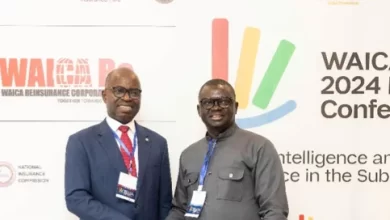ESG Discipline Leads To Increased Profitability

By Liz Booth, Publisher, Africa Ahead
Following environmental, social and governance (ESG) principles can actually lead to an increase in profit, suggests the chief financial officer (CFO) of a large African insurer.
Kevin Nyakeri, chief financial officer at ICEA Lion Life Assurance, explained that a switch to ESG principles has resulted in less business but higher profits. He said that following ESG principles was also helping guide investments.
“We are ready to support the cause,” he said. It has taken time to fully embed ESG principles into the culture of the business but Mr Nyakeri said the journey has been worthwhile and he suspects it will be even quicker for others now that ESG has become a regular conversation. “It really helps that management is supporting it and there is finance available,” he said, but added that ESG principles are now embedded throughout the business, including in financial reporting.
“One of the ways we promote this in our reporting, is that we dedicate part of our annual statements and records to matters of sustainability – what we do and how it has an impact on sustainability,” he said.
Mr Nakeri admitted: “Initially I didn’t understand what this was about and it just looked like additional work. But I started attending meetings and got onboard. It has made a whole lot of difference in terms of how we report. We used to have traditional reporting but now 50% of our reporting is around people, while previously it was just about profit. We were the first insurance company in this region to go that way and it helps that we are one of the largest insurance groups because that gives us credibility.”
He said he now sees that others are following suit in changing the approach of their reports.
Added to that, Mr Nyakeri said the ESG approach is important when it comes to the group investments. “We do have a strategy of investment opportunities in this part of the world that are green opportunities,” he said. “There are green bonds that we invest in. We are already voting through our investments in Africa.”
Now there is an added incentive for insurers to adopt an ESG approach to their business, he believes. “Before the Nairobi Declaration [launched in April 2021], ESG looked like a ‘nice to have’. Back when we started out journey, some partners were saying that ESG principles were excessive and not necessary but now, a few years on and with our membership of global bodies and culminating in the Nairobi Declaration as well as the regulator coming onboard, people started finding it a nice thing to be a part of.
“By the time we were ready for the Nairobi Declaration, a few companies came onboard at the launch and we now get calls from other CFOs who want to know more.”
Sometimes, he acknowledged, it can be hard for people to understand how these principles work in practice.
“An example of our work is the conservation of the lion. We have a lion in our logo and it is an endangered species so we support conservation initiatives and we have the proof that we are spending towards sustainability. It is about evidencing what we were already doing,” said Mr Nyakeri.
Another practical example is that the group developed statistics around diversity in all its forms – gender, age and background – for the group, which helped everyone relate the conversation to sustainability.
“By some stroke of luck we are 50:50 men and women, with slightly more women in the workforce and about one third in senior management,” he said.
Mr Nyakeri added: “The other thing about a good representation between men and women, different age groups and different backgrounds is that it provides balance, particularly for management; you find ladies are good planners and make good operational teams. They are into the how of things.
“Men will often come up with an idea, but it is the woman who will ask how that could be achieved and what are the risks? If we were purely male dominated, maybe we would have taken more risks and fallen short on the planning.
“Also, we find we learn a lot from the young people on innovation but also on changing cultural trends. If we hadn’t diluted experience with youth, we would not have developed in the successful way that we have.”
He stressed: “It takes time but we have been working on this for five years. We started by looking at sustainability on its own but now it is part of all that we do.”
Considering the G for governance, he said: “Governance was a big part of it. Again, it was already a big part of our DNA and we had won accolades for our corporate governance and generally had a reputation for good governance.”
Belonging to international bodies, such as the UN Principles for Sustainable Insurance, UNEP FI and the Taskforce for Financial Disclosures, is important too, said Mr Nyakeri, adding: “We are able to use this in our marketing – we are not just about Kenya but talking on a global level.”
Answering the question of whether ESG principles had helped the bottom line, Mr Nyakeri said: “ESG gives you a framework. We know we have lost business because of our integrity and our strict governance. Sometimes it means we can’t acquire business for the sake of it. It has kept us grounded and we have not grown the top line as fast as we should, but we are one of the most profitable companies in this part of the world. We have one of the best balance sheets among insurers. It has helped us screen business, which gives us an edge in terms of profitability.”
Too often, people think ESG is purely about social responsibility or saving the planet but it is much more than that, stressed Mr Nyakeri.
“You realise that this is a multi-pronged approach. It is about private sector, public sector, government and international bodies,” he said.
He suggested that for anyone starting out on their ESG journey, the first port of call should be internal and about normalising this conversation.
“Once we had the CEOs and key figures onboard, we needed more partners – particularly the regulators. A lot of our lobbying may not be so obvious but we are quietly working. We were delighted when the Central Bank of Kenya released guidelines recently – why can’t the insurance sector do the same? We need targets around sustainability. There is a big responsibility on us to lobby, to share with our employees and to share with likeminded companies. It is on our shoulders to take this to another level,” My Nyakeri concluded.





